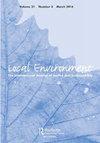Hydropower policy in Ecuador: an analysis from environmental perspective and recommendations for future policymaking
IF 2.8
3区 环境科学与生态学
Q3 ENVIRONMENTAL STUDIES
引用次数: 0
Abstract
ABSTRACT Renewable energies are vital to tackle climate change and reduce environmental issues. In this sense, hydropower plays a key role. Broadly speaking, hydropower is perceived as a climate ally and considered environmentally sustainable. However, its development is still controversial due to the well-known environmental and ecological impacts that put its environmental sustainability in question. In this sense, this study aims to analyse and discuss hydropower development and policy in Ecuador from an environmental perspective. The analysis addresses the research question of to what extent the business-as-usual hydropower policy is compatible and consistent with national environmental sustainability and Buen Vivir (Good Living) goals. For such purpose, the analysis is conducted by applying a proposed conceptual framework composed of critical elements such as Buen Vivir principles, rights of nature and the evidence on the environmental sustainability of hydropower. The analysis highlights the main environmental drawbacks of the BAU-HP policy and finds that the current development and policy of hydropower is ultimately detrimental to achieving national environmental sustainability and Buen Vivir. Moreover, it easily infringes the Rights of Nature and conflicts with the conservation of ecosystems and biodiversity. Following the findings, several environmental sustainability-oriented recommendations are suggested for future hydropower policymaking.厄瓜多尔水电政策:从环境角度分析及对未来政策制定的建议
本文章由计算机程序翻译,如有差异,请以英文原文为准。
求助全文
约1分钟内获得全文
求助全文
来源期刊

Local Environment
Environmental Science-Management, Monitoring, Policy and Law
CiteScore
4.10
自引率
4.20%
发文量
88
期刊介绍:
Local Environment: The International Journal of Justice and Sustainability is a refereed journal written by and for researchers, activists, non-governmental organisations, students, teachers, policy makers and practitioners. Our focus is specifically on sustainability planning, policy and politics in relation to theoretical, conceptual and empirical studies at the nexus of equity, justice and the local environment. It is an inclusive forum for diverse constituencies and perspectives to engage in a critical examination, evaluation and discussion of the environmental, social and economic policies, processes and strategies which will be needed in movement towards social justice and sustainability - "Just Sustainabilities" - at local, regional, national and global scales.
Please note that we only accept submissions that share our focus. Based on critical research and practical experience, we are particularly seeking submissions from nations and continents representing different levels of income and industrial development and from countries in transition in order to engage in mutual learning and understanding.
 求助内容:
求助内容: 应助结果提醒方式:
应助结果提醒方式:


